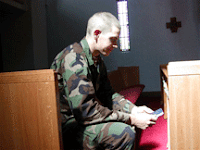(This prayer comes from the 1928 American Book of Common Prayer)
O GOD of peace, who hast taught us that in returning and rest we shall be saved, in quietness and in confidence shall be our strength; By the might of thy Spirit lift us, we pray thee, to thy presence, where we may be still and know that thou art God; through Jesus Christ our Lord. Amen.
I found this prayer to be convicting, particularly taken in connection with our weekly wing chapel reading of Thomas a Kempis' The Imitation of Christ. As a Christian living in the modern world, and particularly as a college student, finding time for quietness and solitude is itself a grueling process. Balancing eighteen credits and

seventeen hours of work a week while trying to deepen friendships with a few close friends leaves little time to be alone. Yet it is often when I am alone that I am best able to search out my mind and heart and try to conform them to the image of Christ.
Something that I have found extremely helpful to finding this solitude is the Book of Common Prayer and the wisdom and truth it contains. The prayers often seem perfectly fitted to guide my soul back from the dizzying swirl of life
into a closer alignment with its anchor, the Lord Jesus Christ. I have found that by pushing evening prayers to the very last thing I do and making morning prayers the first activity I engage in upon waking I am able to find this time of solitude and realigning.
One thing that I have really begun to appreciate through the use of the Book of Common Prayer and attending (though only once so far) the Church of Our Savior - Oatlands is the Christocentrism of the Anglican faith. Having grown up in more Baptist circles, I had been more inclined to think of God most often as the Trinity. While God does exist as the Trinity, thinking of Him primarily in that way can lead to a sort of abstraction of the Divine (at least it did for me). Taking a course in Metaphysics last fall and this new found wisdom in the Book of Common Prayer has lead me to a much deeper and fuller understanding and appreciation for Christ as part of the Godhead.

This new focus has been incredibly beneficial to my spiritual life as having a clearer understanding of who Christ is enables me to attempt to conform to him in a more effective manner. One of the most fascinating aspects of this for me is that in reading seemingly not at all connected to my conforming to Christ - reading Sartre for example -my initial reaction was not a logical analysis of the argument of the work, but rather an attempt to see how it conformed to "the mind of Christ." This bringing all things in subjection to Christ should not have been new to me, but the lack of having a Christocentric theology made this unclear.
I encourage you to focus on Christ. Christ is our Savior, our Brother, our Advocate, and our Example. We are to strive to conform to His image. Combine this Christocentrism with large (as a college student as large as you can) amounts of solitude, reflection, and soul realignment - it will bless you beyond measure. Though this may seem trite, do not let the busyness of life deter you on this track, you have no idea what you are missing.




